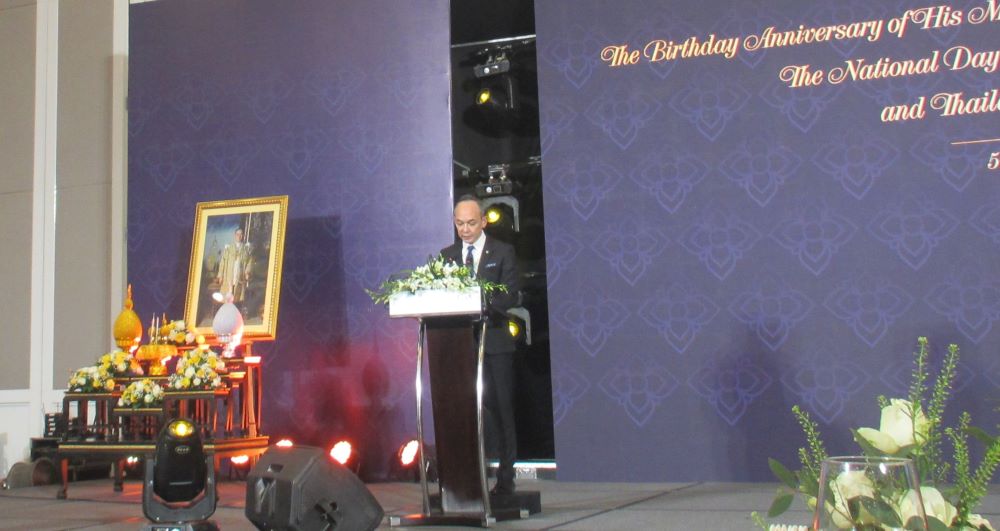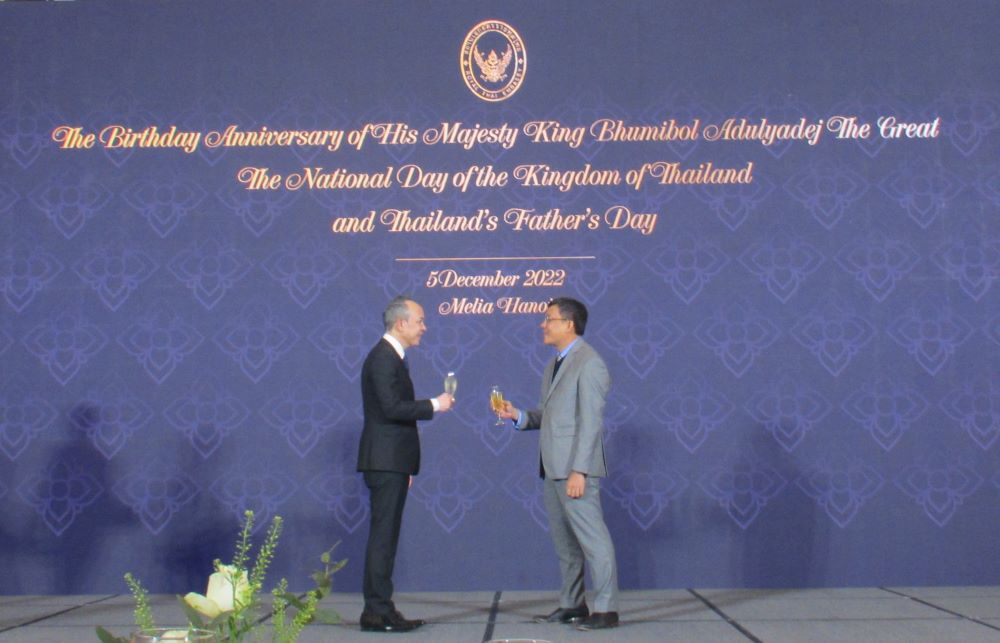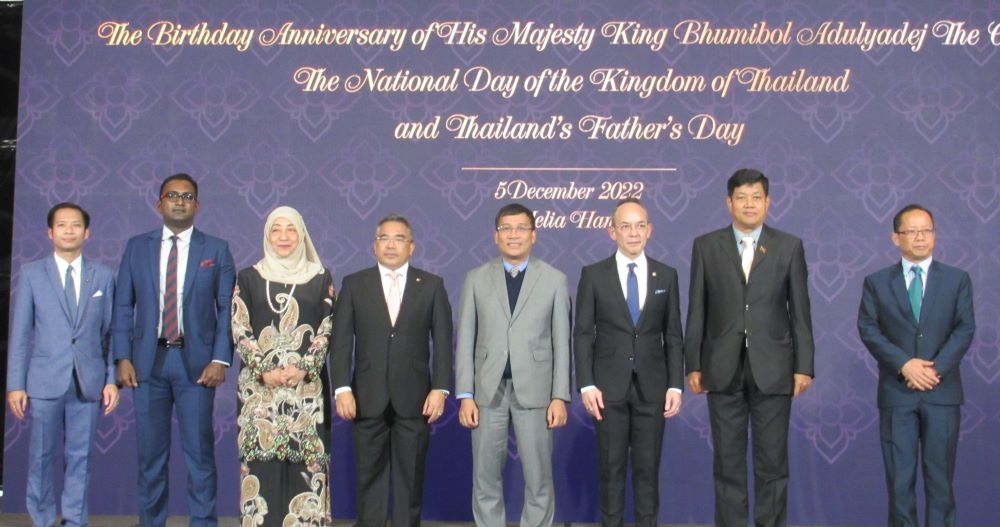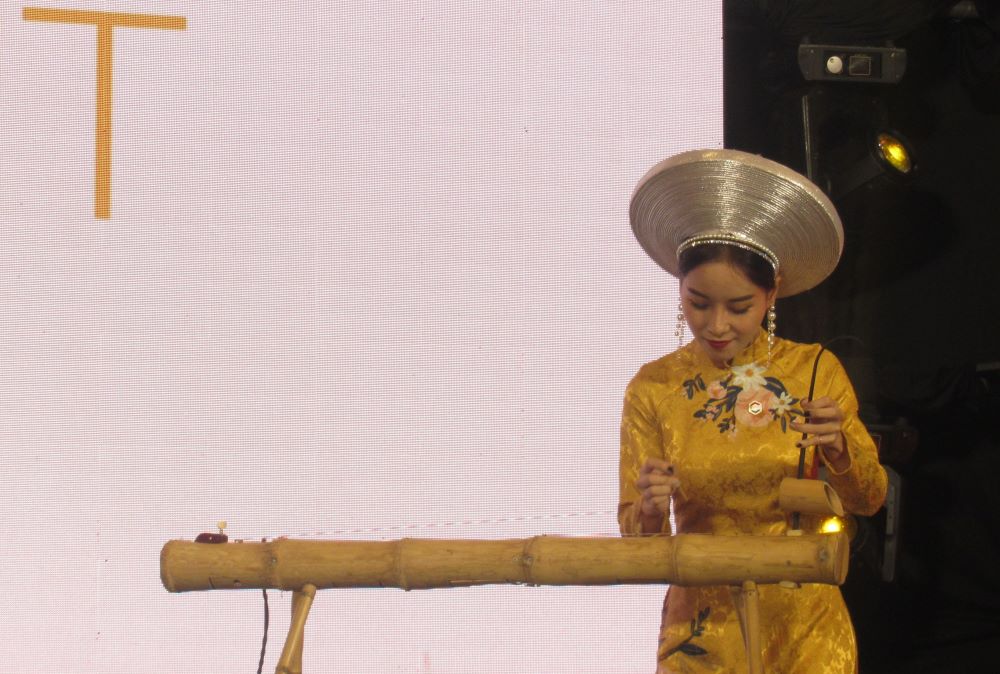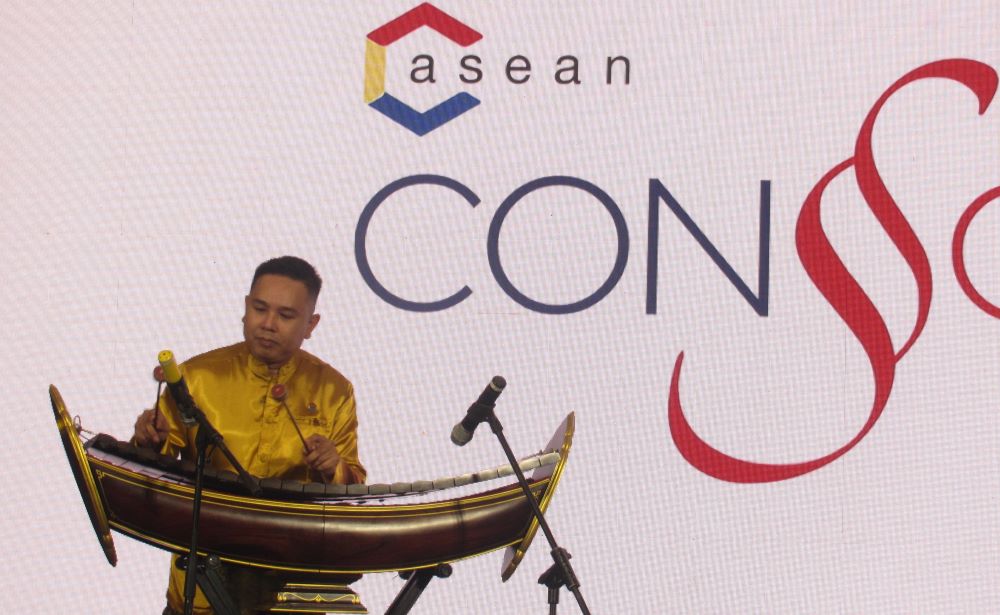Thailand’s philosophy promoted in Vietnam
The philosophy that widely adopted in Vietnam demonstrates the close relationship between the two nations which are now leading trade partners of each other in ASEAN.
Thailand and Vietnam have as close relationship that has been strengthened through different fields, including some initiated by late King Bhumibol Adulyadej.
| Thai Ambassador to Vietnam Nikorndej Balankura delivers a speech at the ceremony held in Hanoi on Dec 2. Photos: Minh Nguyen |
The Sufficiency Economy Philosophy (SEP) is the typical model found throughout Thailand and widely adopted in Vietnam.
According to Thai Ambassador to Vietnam Nikorndej Balankura, SEP is a guideline cultivated by the late King that emphasizes how individuals and communities should establish strong basic economic foundations, through the core principles of moderation, reasonableness, and resilience, in order to ensure sustainable growth.
Today, the SEP Project in Vietnam’s Northern Province of Thai Nguyen aims to contribute to community development, especially in agroforestry, tourism, and tea production.
| Thai Ambassador to Vietnam Nikorndej Balankura and Vietnamese Deputy Foreign Minister Nguyen Minh Vu make a toast at the ceremony. |
The Sufficiency Economy Philosophy (SEP) is the typical model found throughout Thailand and widely adopted in Vietnam.
According to Thai Ambassador to Vietnam Nikorndej Balankura, SEP is a guideline cultivated by the late King that emphasizes how individuals and communities should establish strong basic economic foundations, through the core principles of moderation, reasonableness, and resilience, in order to ensure sustainable growth.
Today, the SEP Project in Vietnam’s Northern Province of Thai Nguyen aims to contribute to community development, especially in agroforestry, tourism, and tea production.
| Vietnam's Deputy Foreign Minister Nguyen Minh Vu (4th from right) and ASEAN Ambassadors at the event. |
SEP is one of two accomplishments of King Adulyadej’s work that have been recognized internationally, Ambassador Balankura said in celebration of the National Day of the Kingdom of Thailand held in Hanoi on December 2.
Another philosophy of the king is soil conservation. His wisdom on soil conservation has contributed to stressing the importance of soil for food security and the well-being of humankind. The United Nations recognized December 5 as “World Soil Day” in 2013. This year, the FAO is celebrating this significant occasion under the theme ‘Soil, where food begins’, to raise awareness on the role of soil.
On this occasion, Ambassador Balankura highlighted December 5 as the day Thailand commemorates four important occasions: the Birthday Anniversary of King Bhumibol Adulyadej; the National Day of the Kingdom of Thailand; Thailand’s Father’s Day; and World Soil Day.
The events indicate that the king was not only the soul of the nation but also a king that placed the well-being and development of his people at the heart of his endeavors. The king’s contributions included areas of education, sustainable development, agriculture, art, engineering, culture and music, among others.
| A Vietnamese artist in C ASEAN Band performs at the event. |
On December 2, 2022, at Melia Hotel, the Royal Thai Embassy organized the reception in celebration of the Birthday Anniversary of His Majesty King Bhumibol Adulyadej the Great, the National Day of the Kingdom of Thailand, and Thailand’s Father’s Day.
At the event, there are two main exhibitions, including “Phuket Corner” to promote Thailand’s candidacy for the specialized expo in 2028 under the theme “Future of Life: Living in Harmony, Sharing prosperity”. Phuket Expo will be focused on 3Ps: People, Planet and Prosperity. These 3Ps are three deeply intertwined factors to build a sustainable future for humankind.
Another exhibition is “Thai Select” corner, the name of the award granted by the Thai Ministry of Commerce, to display Thai delicacies by Thai restaurants in Hanoi.
For the performance, there will be a musical performance by C ASEAN, the one and only ASEAN traditional ensemble using the universal language of music to build a bridge that intertwines ASEAN countries’ heritages and creates stronger bonds of understanding, friendship, and collaboration among the ASEAN community.
| A Thai artist in C ASEAN performs at the ceremony. |
Regarding locality-to-locality cooperation, Thailand and Vietnam established 18 pairs of sister cities, including Hanoi and Bangkok. Accordingly, Hanoi and Bangkok have shared enhanced exchange visits and cooperation in trade, investment, tourism, education, culture, and people-to-people ties. The two cities have shared experiences in urban transport management, flooding prevention, and air pollution control. The cooperation between the two cities, on the basis of mutual benefit and within the limits of their financial and technical capabilities, focuses on city planning, human resource management, and the promotion of public health. Among the fields, the two cities have focused on tourism thanks to high flight frequency. Currently, there have about 1,500 Thai people living in Hanoi, 500 in Ho Chi Minh City, and 1,000 in other localities. Meanwhile, the Vietnamese community in Thailand is about 100,000. |

